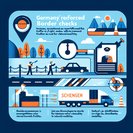
From today, German schools can once again cross the Channel with far less paperwork. Under a policy that enters force on 4 November, groups of at least five pupils aged 19 or under travelling on an officially organised study trip are exempt from both the UK’s new Electronic Travel Authorisation (ETA) and the standard visitor visa.
The change is the first tangible deliverable of the bilateral youth-mobility agreement signed by London and Berlin in July. It effectively reinstates, for Germany only, the privileges lost when the EU “List of Travellers” scheme died after Brexit. Until now, the ETA pilot—set to expand to all non-visa-exempt nationals in 2026—posed a logistical headache for schools: most German pupils do not hold passports, and processing an ETA for each child risked trip cancellations.
![UK Scraps ETA/Visa Requirement for German School Groups From 4 November]()
Operational details. EU-citizen students may travel on their national identity cards, while non-EU classmates need only a passport; teachers and adult chaperones must still obtain an ETA or visa. The exemption applies to stays of up to 30 days for educational or cultural purposes and cannot be used for work placements. UK Border Force will accept a group manifest issued by the school and certified by the German Kultusministerium.
Economic impact. Post-Brexit red tape slashed German study-tour numbers by an estimated 80 percent between 2020 and 2024, hitting language schools, coach operators and host families across southern England. The British Council projects that today’s rule change could restore €110 million in annual educational-tourism revenue within two seasons. For German mobility managers, the move removes a pain-point in staff-kids accompaniment policies and revives short-term teacher exchanges that had stalled.
What companies should do. • Update corporate travel tools: employees escorting student groups as part of CSR programmes now fall under the exemption. • Re-check insurance clauses—UK stays again qualify as ‘school trips’ for most German insurers. • Expect higher demand for spring 2026 slots; early booking is advised as coach parking at Dover remains constrained during the EES roll-out.
The change is the first tangible deliverable of the bilateral youth-mobility agreement signed by London and Berlin in July. It effectively reinstates, for Germany only, the privileges lost when the EU “List of Travellers” scheme died after Brexit. Until now, the ETA pilot—set to expand to all non-visa-exempt nationals in 2026—posed a logistical headache for schools: most German pupils do not hold passports, and processing an ETA for each child risked trip cancellations.

Operational details. EU-citizen students may travel on their national identity cards, while non-EU classmates need only a passport; teachers and adult chaperones must still obtain an ETA or visa. The exemption applies to stays of up to 30 days for educational or cultural purposes and cannot be used for work placements. UK Border Force will accept a group manifest issued by the school and certified by the German Kultusministerium.
Economic impact. Post-Brexit red tape slashed German study-tour numbers by an estimated 80 percent between 2020 and 2024, hitting language schools, coach operators and host families across southern England. The British Council projects that today’s rule change could restore €110 million in annual educational-tourism revenue within two seasons. For German mobility managers, the move removes a pain-point in staff-kids accompaniment policies and revives short-term teacher exchanges that had stalled.
What companies should do. • Update corporate travel tools: employees escorting student groups as part of CSR programmes now fall under the exemption. • Re-check insurance clauses—UK stays again qualify as ‘school trips’ for most German insurers. • Expect higher demand for spring 2026 slots; early booking is advised as coach parking at Dover remains constrained during the EES roll-out.










